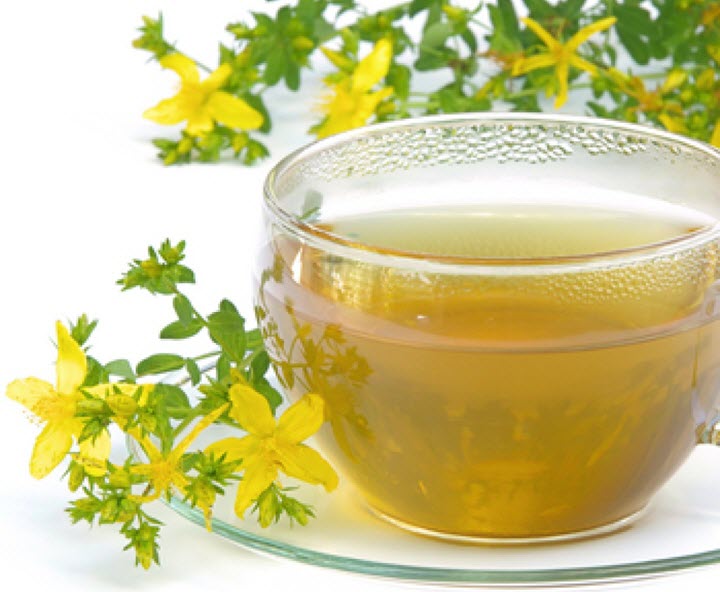A decoction of St. John's wort will help from many diseases, as it has a rich vitamin and mineral composition. The plant belongs to the flowering family St. John's wort, order Malpighiaceae. Previously, the genus of plants was attributed to the composition of the Cluziaceae family.
The flower has more than 458 species distributed throughout the globe. Most of the varieties are distributed in the Northern Hemisphere and in the tropical zone in the south. Most species are found in the Mediterranean.
Most species are perennial herbaceous plants, rarely annuals. In appearance, there are so many flowers that among them there are shrubs, semi-shrubs and even trees.
Stems are tetrahedral. The leaves of most species are sessile, with short petioles.
If you carefully look at the leaf in the light, you can see thin black streaks in the lumen. Flowers solitary, collected in umbrellas. The flower calyx is semidivided.
The flower has five petals and is bright yellow in color. The base in the center of the petals is round. The fruit is in the form of a leathery box, inside there are seeds.
Blooms from June to August. Starting from mid-summer, the flower is harvested and dried. It is necessary to dry the collected tops of the stems with flowers at a temperature of 40 degrees, and the shelf life of the shrub is up to three years.
The plant is widely distributed throughout the CIS, in particular Russia. The most numerous species are four-headed St. John's wort and common. Both subspecies have found equally good use in traditional medicine due to their medicinal properties.
A decoction of St. John's wort cannot be used in home veterinary medicine, since the use of a decoction in animals causes weakness and dizziness. There are evergreen species. For agriculture, the following types of St. John's wort are valuable:
- Gnarled (small, wild shrub, branchy and beautiful, recommended for landscaping gardens and street decoration).
- Creeping.
- Perforated or ordinary grows well on dry soils.
- Tetrahedral - a weed that needs to be taken for various diseases.
- Woody is also called zenovka and zinovet.
For what ailments should the plant be taken?
The semi-shrub has been widely used in folk medicine due to its wide range of positive effects on various diseases. In total, St. John's wort treats about 80 known
diseases. Shrub should be taken when:
- Depressive states.
- Insomnia.
- sleepwalking.
- Chronic fatigue.
- Seasonal depressive exacerbations.
- Overweight.
- Cirrhosis of the liver.
- Ascites.
- Hepatitis.
- Dyskinesia of the biliary tract.
- Gastritis with high acidity.
- Ulcer of the stomach and duodenum.
- Pain in the stomach.
- Worm infestations.
- Lack of appetite.
- Varicose veins.
- Reduced blood pressure.
- Arthritis.
- Varicose ulcers.
- Cardiovascular insufficiency.
- From alcoholism.
- Burns (external use).
- Colds.
- Cough.
- Pathologies of the respiratory tract.
- Hemorrhoids.
- Gout.
- Tuberculosis.
- Diarrhea.
- Urinary incontinence (enuresis) and diseases of the bladder.

Recipes for decoctions for alcoholism and various ailments
For the treatment of alcoholism, you need to take a decoction of St. John's wort.
For cooking, you will need one and a half tablespoons of dried herbs, filled with boiling water. It is desirable to boil the mixture in a water bath for at least fifteen minutes. After the expiration of the period, wait until the finished mixture has completely cooled down. When the liquid has cooled, it is filtered through a dense layer of gauze. If after boiling the liquid mixture there is too little left, then you can add 200 milliliters of boiled water to the finished mixture. take at least two or three weeks, three times a day after meals. It is important to understand that the use of one decoction will not relieve a severe psychological illness. The treatment of alcoholism should be comprehensive and aimed at combating the root cause of the appearance of a serious addiction. From alcoholism, medications that reduce cravings for alcohol-containing drinks, antidepressants, drugs that restore health and normalize body functions (a decoction based on St. Moreover, a single medical or psychological intervention is not enough to cure alcoholism. First of all, the close support of relatives and friends of the patient, as well as a strong desire, a strong-willed effort of an alcoholic, will help well from alcoholism.
With pathologies of the gastrointestinal tract and lung diseases.
Take 10 grams of St. John's wort, pour hot boiling water (one glass of hot water). The mixture should be boiled over low heat for at least half an hour. After the mixture is removed from heat and cooled for about ten minutes. Next, the broth should be well filtered through a dense layer of gauze. Application: drink a third of a glass (70 milliliters) 3 times a day half an hour before meals. Take the drug should be at least a month to speed up recovery.
St. John's wort tea.
Tea is a universal remedy that should be taken with a weakened immune system to prevent the occurrence of acute respiratory viral diseases in adverse weather, to treat mental overexcitation, for colds, and indigestion. It is recommended to drink tea freshly prepared hot. Ten grams of dried flowers of the plant are taken (half a tablespoon) and poured with a mug of hot boiling water, covered with a dense bowl for a quarter of an hour and infused. As fifteen minutes pass, the liquid is filtered and drunk.
Take for therapeutic purposes for at least a month, once a day. The interval between meals does not matter. If desired, you can add honey to tea as a natural and healthy sweetener or mint for a spicy flavor.
The plant is taken in a strict dosage, it should not be taken deviating from the indicated dose in the recipe, as it has a weak toxic effect and unpleasant side effects can occur in case of overdose. In diseases of the gastrointestinal tract, it is necessary to drink the infusion after or before meals, depending on the pathology. Alcohol tinctures should not be given to people with alcohol dependence.
Contraindications to the use of plant recipes
Do not give herbal medicine to children, pregnant women and during lactation. It is contraindicated to use a remedy with high blood pressure, as it has a hypertensive effect. The herb should not be used orally for a long time, it has a slight toxic effect and with prolonged use, heaviness in the stomach and a bitter taste in the mouth may appear. In some men, long-term use may cause temporary impotence. After stopping the intake, libido returns to normal. During the period of plant therapy, it is undesirable to visit solariums. Strong tea cannot be brewed, otherwise they may appear.



